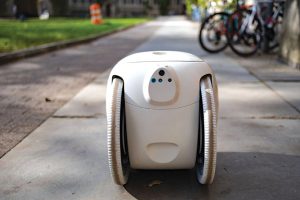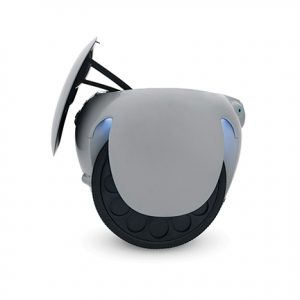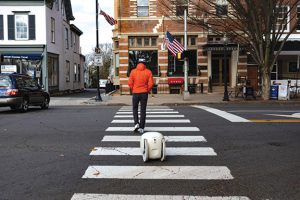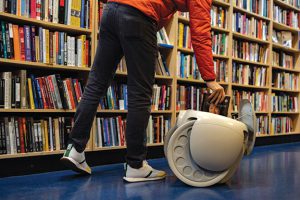Bloomberg
When a six-year-old boy first “woke up†the Gitamini robot, his parents were surprised he didn’t flinch — robots these days tend to be ominous. But as November leaves swirled around the sidewalk meet-cute, the squat personal droid gave a friendly “chirp†and popped up on its two large wheels, ready to follow a new friend.
Service robots are now an $11 billion industry, according to the International Federation of Robotics, with nearly 200 new fleets launched during the pandemic. Most of those bots are in hospitals — assisting in surgery, for example — and many can be found trundling around warehouses and factories. But Gitamini wasn’t designed to pack boxes, pick oranges or strip minerals from treacherous mines. It has a more straightforward mission: to forestall short car trips. Americans make nearly four such trips per day on average, according to government statistics, and 35% of them are less than two miles.
Gita — Italian for “trip†— hopes to be a 28-pound solution to a 5,000-pound problem. “These trips are totally walkable, but nobody’s walking two miles with a bag of dog food,†says Greg Lynn, chief executive officer of Gitamini-maker Piaggio Fast Forward. “We definitely want to be part of the ecosystem where you don’t have to take a two-ton thing to carry two bags of stuff.â€
Trace the Gita family tree back a few generations and one arrives at the Vespa. Seven years ago, Italian conglomerate Piaggio & C SpA was looking for a product to crack the American market, where its Vespa bikes hadn’t fully caught on. The company opened a research lab in Boston dubbed Piaggio Fast Forward and charged it with cooking up a micro-mobility solution that would play in the US.
A residential flight to urban exurbs and walkable suburbs, combined with the nascent work-from-home movement, had theoretically primed the market for Star Wars-style assistants. From its Boston skunk-works, full of architects and urban planners, Piaggio in 2019 launched the first Gita, essentially a larger version of the Gitamini. But at $3,250, market reception from early customers was muted, and the feedback was focused: Make a smaller one.
Gitamini ($1,850) rolled out in September 2021, slight enough for a person to carry up a flight of stairs and designed to travel anywhere a wheelchair might, including ramps and elevators. The machine pairs to its chaperone using two cameras and depth-sensing radar, which profile the silhouette and clothing of whoever stands in front of it and pushes the “wake up†button.
Once underway, Gitamini zips up to 6 miles per hour, carries up to 20 pounds and can cover 21 miles on a charge. At 1,000 cubic inches, its cargo hold can swallow a 12-pack with some room to spare, and the bot can handle “moderately uneven†surfaces like gravel and grass, though sand and snow are still a bridge too far. The Gitamini has even figured out doors — Piaggio engineers programmed it to scoot through and wait for its human partner on the other side — and it knows to park (with a sad robot moan) if it loses its minder.
In a world fast-filling with sentient droids, robots like Gita — designed to work with a human, not replace one — represent a small but growing slice of the market. This year, the International Federation of Robotics expects people to buy about
45 million droids for personal service or entertainment, a 25%
increase over 2021.
And there is still a fair bit that Gita can’t do. Walking indoors with a Gita is a little bit like trailing something on a string; round a corner too sharply and the robot will think into the wall. What’s more, the cargo hold doesn’t lock and the bot’s
cameras are happy to pair with anyone who wakes it up.
For a six-year-old, normalisation takes about five minutes. As we made our way across campus, my son tumbled the Gitamini off of a couple of curbs, boosted it over stairs and stopped it often to add to his leaf stash. Everywhere he went, the robot followed him and a parade of gobsmacked pedestrians
followed the robot.
 The Gulf Time Newspaper One of the finest business newspapers in the UAE brought to you by our professional writers and editors.
The Gulf Time Newspaper One of the finest business newspapers in the UAE brought to you by our professional writers and editors.



